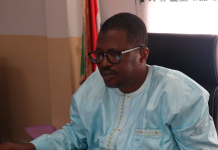Dear fellow citizens of Member State the Permanent Inter-state Committee for Drought Control in the Sahel, on the occasion of the celebration today September 12, 2018, of this 33rd Day, I have a great honour to deliver this message to you on behalf of my fellow Heads of Member State, in my capacity as current Chairman of our common organization.
The theme of this day is the importance of non-woody forest product in enhancing vulnerable household food and nutrition security and livelihood in the Sahel and West Africa. This theme, has been chosen out of a clear desire to promote natural resources of our land to boost production, processing and marketing at regional level.
Non-woody forest product has always played a key role in eating habits of people in the Sahel and in West Africa. In terms of food and nutrition, the availability in our countries generally correspond to worrying season when food stocks are at lowest level and water resources are scarce.
Fellow citizens of CILSS Member States, the value chance of non-woody forest product with nutritional value from species including Baobab Tree, Tamarine tree, shea tree and many others, requires special attention from our countries and producers, where interest in value change, sources of income and job opportunities. 80 percent of collection and processing segments are occupied by women, although no-non-woody forest products are available and important sources of protein, fiber and vitamin and mixed in traced elements where little valued in our various food systems. In fact, they are severely hampered by many social and economic obstacles.
Fellow citizens of CILSS Member States, by choosing this theme to commemorate the 33rd Day of our common institution, CILSS has sought to address one of our long standing concerns, that is building resilience of Sahelian and West African population facing the current of food and nutritional crisis.
I therefore to draw everyone’s attention to the need to ensure protection of our ecosystems remained source of non-woody forest products. This will require implementing robust nature conservation policies. This is also one way for us to fulfill our international commitment with regards to our multilateral environment agreement including international convention on climate change, biodiversity and combating desertification.
Fellow citizens of CILSS Member States, let me take this opportunity to thank and invite the technical and financial partners of CILSS, Inter-Governmental Organizations, particularly ECOWAS and, national parliaments and organization of Civil Society Actors, including Non-Governmental Organizations and the Media to continue to provide supports to CILSS and its Member States in this new momentum.
I wish CILSS success in addressing challenges in coming years, particularly through the process of organizational and institutional reforms to confirm its regional leadership in its areas of expertise.
















